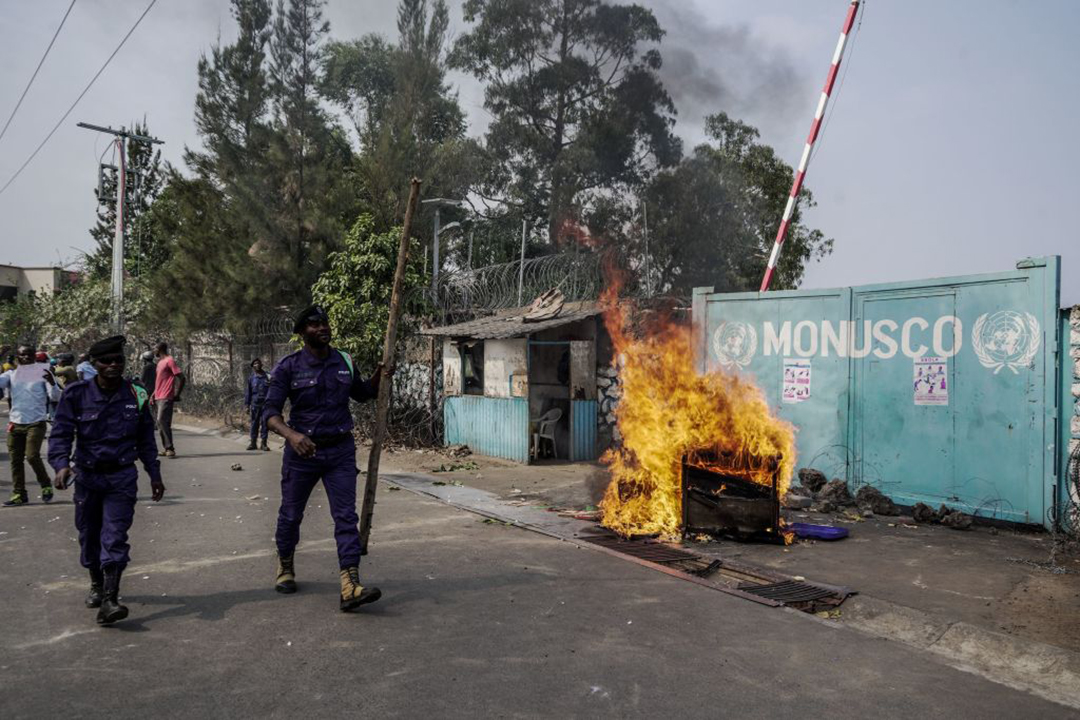DRC Protests Raise Questions About Future of U.N. Peacekeeping
ADF STAFF
Anti-United Nations protests in the eastern Democratic Republic of the Congo (DRC) have spurred experts and stakeholders to consider major changes to the approach to missions around the world.
The three most complex missions in Africa — in the DRC, Mali and the Central African Republic — are called “stabilization” missions. They deal with an array of political challenges, criminal networks, extremist groups and mercenaries. There is no durable peace to keep in these countries, so the objective is to stabilize each country enough for its own government to operate.
These types of missions are now being reconsidered. They typically cost over $1 billion per year and require support from 10 or more troop-contributing countries. In many cases they last for decades without stopping the violence.
“This model is going out of fashion because, while it has a fairly good record of preventing atrocities, it has a fairly poor record of building lasting peace,” wrote Fred Carver, an advisor to the United Nations Association-UK, on the website PassBlue.
This is the case in the eastern DRC where the 16,000-strong U.N. force now known as MONUSCO has operated for more than 22 years. Since its creation, it has faced continuous cycles of violence caused by more than 100 armed groups, rebels, terrorists and local militias.
Protesting civilians are demanding better results.
“There was a clear expectation from the DRC population that MONUSCO would come and help,” Dr. Yvan Yenda Ilunga, an expert on humanitarianism and security originally from the DRC, told the BBC.
MONUSCO’s mandate says it will leave the DRC in 2024. But the government has hinted that it might revisit that timeline.
Dr. Cedric de Coning, a senior advisor to the African Centre for the Constructive Resolution of Disputes, says the U.N. is rethinking its large-scale missions.
“We are at an interesting moment, because the United Nations hasn’t deployed any large peacekeeping operations since 2014,” he told the BBC. “They’ve preferred to deploy smaller, political missions.”
In the future, De Coning sees smaller military components of peacekeeping missions playing a supporting role to diplomatic efforts.
“I see a greater focus in the future in solving these problems politically,” de Coning said. “The peacekeeping operation can deal with some of the symptoms on the ground, but to resolve these kinds of conflicts we need to focus on the diplomatic and political dimension.”
Others have pointed to the need for more community engagement. Carver said future missions need to see the host community, not just the state, as its client. This would mean that community members get to set priorities and goals for the U.N.
“Certainly, in the Congo, UN peacekeeping could either become more locally led or continue to be locally resisted,” he wrote. “It’s time for a big change.”
Ilunga says the complexity of the problems in eastern DRC and the lack of civilian trust require that the peacekeeping mandate be revisited or even reimagined.
“When we think of U.N. peacekeeping, we have a clear assumption that there is a peace to keep,” he said. “But many of these places there is no peace to keep. So we have to move into the idea of peacemaking.
“We need to strengthen the ability of these troops that we deploy, we need to give them a mandate and equip them with skills and logistics to make peace instead of trying to keep what is not there.”
Given the sheer number of armed groups and their separate agendas, Ilunga said the U.N. can no longer conduct traditional operations that lead to negotiated settlements with host countries.
“The U.N. is still acting like it’s a conversation around a table,” he said. “You send in troops who are not prepared to fight the guerilla type of warfare, it will not work.”


Comments are closed.